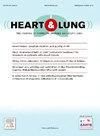The Impact of the GEtting iNTo Light Exercise for Heart Failure (GENTLE-HF) Randomized Controlled Trial on Physical-Psychological Outcomes and Exercise Adherence
IF 2.6
4区 医学
Q2 CARDIAC & CARDIOVASCULAR SYSTEMS
引用次数: 0
Abstract
Background
Exercise is recommended to improve the lives of patients with heart failure (HF), but numerous barriers prevent exercise engagement and long-term exercise adherence. Yoga has been studied as a complementary therapy for patients with HF. Small pilot studies show short-term benefits of yoga-like gentle exercise for individuals with HF. Few investigators have examined the effect of online yoga exercise interventions on long-term benefits and exercise adherence.
Aim
The study aims were to: 1) Evaluate the efficacy of a 6-month online yoga and educational intervention on physical and psychological function, 2) Evaluate whether age or sex moderated the efficacy of the intervention on physical function, and 3) Determine the relationship between quality of life scores and exercise adherence in patients with HF.
Methods
Data from the Getting iNTo Light Exercise for HF (GENTLE-HF) randomized control trial (n = 61) was analyzed. Measures included physical function (tests of flexibility, upper/lower body strength, agility, balance, endurance, waist circumference), psychological function (depression and anxiety), quality of life, and exercise adherence. A general linear ANCOVA-approach model was used to examine physical and psychological function, adjusting for age, years of education, baseline study scores, and grouping (control or intervention). Pearson correlation analysis was used to examine the relationship between baseline quality of life scores and yoga intervention adherence.
Results
Compared to control, the intervention group had improved upper body strength (p = .004), lower body strength (p = .002), and endurance (p = .003). Age moderated the effect of the intervention on upper body strength (p = .012) and endurance (p = .028). Psychological (depression and anxiety) function did not significantly differ between the groups. Adherence was high at 62.5%. Greater quality of life scores were associated with higher exercise adherence (p = .039).
Conclusions
The online yoga intervention led to significant improvements in upper/lower body strength and endurance among participants, had a stronger, additional effect for participants over 65 years, and had high adherence rates. The study also demonstrated that greater quality of life was associated with higher exercise adherence. Online exercise programs incorporating yoga can increase exercise accessibility and improve exercise adherence rates. The findings from this study can impact HF exercise guidelines with potential recommendations for gentle types of exercise, inform future large-scale yoga studies, and improve outcomes among patients with HF.
轻度运动治疗心力衰竭(GENTLE-HF)随机对照试验对生理-心理结局和运动坚持性的影响
运动被推荐用于改善心力衰竭(HF)患者的生活,但许多障碍阻碍了运动参与和长期坚持运动。瑜伽已被研究作为心衰患者的补充疗法。小规模的试点研究表明,类似瑜伽的温和运动对心力衰竭患者有短期好处。很少有研究人员研究在线瑜伽运动干预对长期益处和坚持锻炼的影响。目的本研究的目的是:1)评估为期6个月的在线瑜伽和教育干预对身心功能的影响,2)评估年龄和性别是否会调节干预对身体功能的影响,3)确定HF患者生活质量评分与运动依从性之间的关系。方法对进行轻度运动治疗HF (GENTLE-HF)随机对照试验(n = 61)的数据进行分析。测量包括身体功能(柔韧性、上半身/下半身力量、敏捷性、平衡、耐力、腰围测试)、心理功能(抑郁和焦虑)、生活质量和锻炼依从性。采用一般线性ancova方法模型检查身体和心理功能,调整年龄、受教育年限、基线学习分数和分组(对照组或干预组)。使用Pearson相关分析来检验基线生活质量评分与瑜伽干预依从性之间的关系。结果与对照组相比,干预组上肢力量(p = .004)、下肢力量(p = .002)和耐力(p = .003)均有改善。年龄调节干预对上身力量(p = .012)和耐力(p = .028)的影响。心理(抑郁和焦虑)功能在两组之间没有显著差异。依从性高达62.5%。较高的生活质量评分与较高的运动依从性相关(p = .039)。结论:在线瑜伽干预显著提高了参与者的上半身/下半身力量和耐力,对65岁以上的参与者有更强的额外效果,并且坚持率高。该研究还表明,较高的生活质量与较高的运动坚持度有关。结合瑜伽的在线锻炼项目可以增加锻炼的可及性,提高锻炼的坚持率。这项研究的发现可以影响心衰运动指南,为潜在的温和运动类型推荐,为未来的大规模瑜伽研究提供信息,并改善心衰患者的预后。
本文章由计算机程序翻译,如有差异,请以英文原文为准。
求助全文
约1分钟内获得全文
求助全文
来源期刊

Heart & Lung
医学-呼吸系统
CiteScore
4.60
自引率
3.60%
发文量
184
审稿时长
35 days
期刊介绍:
Heart & Lung: The Journal of Cardiopulmonary and Acute Care, the official publication of The American Association of Heart Failure Nurses, presents original, peer-reviewed articles on techniques, advances, investigations, and observations related to the care of patients with acute and critical illness and patients with chronic cardiac or pulmonary disorders.
The Journal''s acute care articles focus on the care of hospitalized patients, including those in the critical and acute care settings. Because most patients who are hospitalized in acute and critical care settings have chronic conditions, we are also interested in the chronically critically ill, the care of patients with chronic cardiopulmonary disorders, their rehabilitation, and disease prevention. The Journal''s heart failure articles focus on all aspects of the care of patients with this condition. Manuscripts that are relevant to populations across the human lifespan are welcome.
 求助内容:
求助内容: 应助结果提醒方式:
应助结果提醒方式:


